英语主动句与被动句转换
- 格式:doc
- 大小:28.50 KB
- 文档页数:2
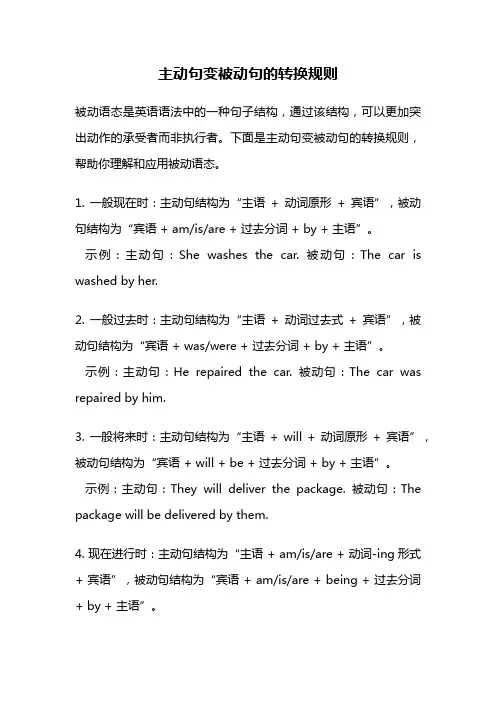
主动句变被动句的转换规则被动语态是英语语法中的一种句子结构,通过该结构,可以更加突出动作的承受者而非执行者。
下面是主动句变被动句的转换规则,帮助你理解和应用被动语态。
1. 一般现在时:主动句结构为“主语+ 动词原形+ 宾语”,被动句结构为“宾语 + am/is/are + 过去分词 + by + 主语”。
示例:主动句:She washes the car. 被动句:The car is washed by her.2. 一般过去时:主动句结构为“主语+ 动词过去式+ 宾语”,被动句结构为“宾语 + was/were + 过去分词 + by + 主语”。
示例:主动句:He repaired the car. 被动句:The car was repaired by him.3. 一般将来时:主动句结构为“主语+ will + 动词原形+ 宾语”,被动句结构为“宾语 + will + be + 过去分词 + by + 主语”。
示例:主动句:They will deliver the package. 被动句:The package will be delivered by them.4. 现在进行时:主动句结构为“主语 + am/is/are + 动词-ing形式+ 宾语”,被动句结构为“宾语 + am/is/are + being + 过去分词+ by + 主语”。
示例:主动句:She is writing a letter. 被动句:A letter is being written by her.5. 过去进行时:主动句结构为“主语 + was/were + 动词-ing形式+ 宾语”,被动句结构为“宾语 + was/were + being + 过去分词+ by + 主语”。
示例:主动句:They were preparing dinner. 被动句:Dinner was being prepared by them.6. 现在完成时:主动句结构为“主语 + have/has + 过去分词 + 宾语”,被动句结构为“宾语 + have/has + been + 过去分词 + by + 主语”。
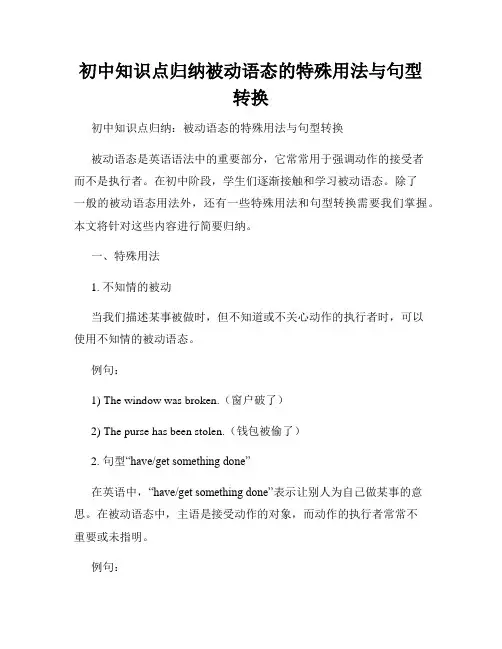
初中知识点归纳被动语态的特殊用法与句型转换初中知识点归纳:被动语态的特殊用法与句型转换被动语态是英语语法中的重要部分,它常常用于强调动作的接受者而不是执行者。
在初中阶段,学生们逐渐接触和学习被动语态。
除了一般的被动语态用法外,还有一些特殊用法和句型转换需要我们掌握。
本文将针对这些内容进行简要归纳。
一、特殊用法1. 不知情的被动当我们描述某事被做时,但不知道或不关心动作的执行者时,可以使用不知情的被动语态。
例句:1) The window was broken.(窗户破了)2) The purse has been stolen.(钱包被偷了)2. 句型“have/get something done”在英语中,“have/get something done”表示让别人为自己做某事的意思。
在被动语态中,主语是接受动作的对象,而动作的执行者常常不重要或未指明。
例句:1) I had my hair cut.(我理了发)2) She got her car repaired.(她让人修了车)3. 句型“be to blame for”当我们想表达某事是由某人负责或应该为其负责时,可以使用“be to blame for”这一被动语态句型。
例句:1) He is to blame for the accident.(他应为这次事故负责)2) They were to blame for the delay.(他们应对耽搁负责)二、句型转换1. 主动句变被动句将主动句转换为被动句时,需要注意以下几点:1) 主语变为被动语态的主语;2) 动词使用被动形式(be+过去分词);3) 如果主动句中有宾语,需要将其变为被动语态句中的主语。
例句:1) 主动句:They build bridges.(他们建桥)被动句:Bridges are built by them.(桥被他们建造)2. 被动句变主动句将被动句转换为主动句时,可以根据以下步骤进行:1) 被动语态的主语变为主动语态的宾语;2) 被动语态的谓语动词变为主动语态的谓语动词;3) 被动语态的宾语变为主动语态的主语。
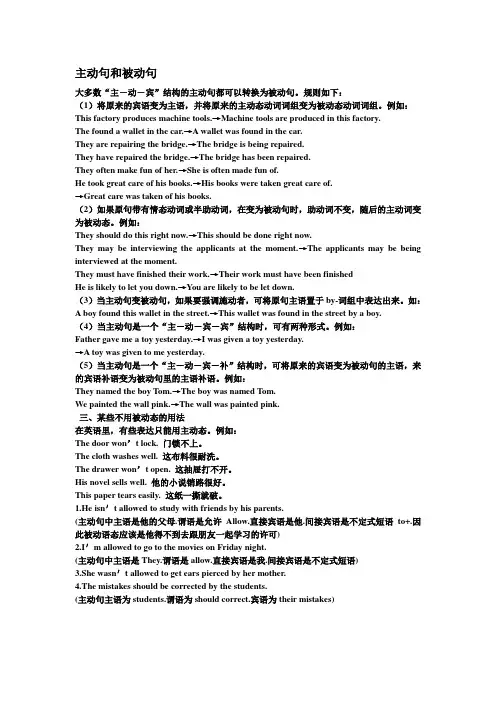
主动句和被动句大多数“主-动-宾”结构的主动句都可以转换为被动句。
规则如下:(1)将原来的宾语变为主语,并将原来的主动态动词词组变为被动态动词词组。
例如:This factory produces machine tools.→Machine tools are produced in this factory.The found a wallet in the car.→A wallet was found in the car.They are repairing the bridge.→The bridge is being repaired.They have repaired the bridge.→The bridge has been repaired.They often make fun of her.→She is often made fun of.He took great care of his books.→His books were taken great care of.→Great care was taken of his books.(2)如果原句带有情态动词或半助动词,在变为被动句时,助动词不变,随后的主动词变为被动态。
例如:They should do this right now.→This should be done right now.They may be interviewing the applicants at the moment.→The applicants may be being interviewed at the moment.They must have finished their work.→Their work must have been finishedHe is likely to let you down.→You are likely to be let down.(3)当主动句变被动句,如果要强调施动者,可将原句主语置于by-词组中表达出来。
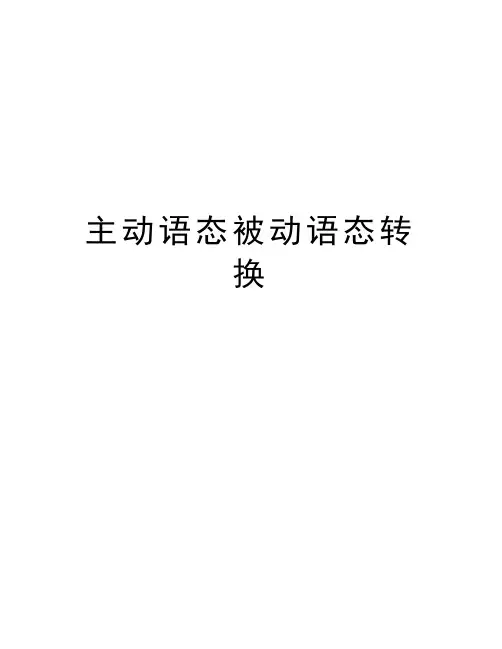
主动语态被动语态转换主动语态被动语态转换主动句My father wrote the book.我父亲写了这本书。
被动句:The book was written by my father.这本书是我父亲写的主动句:Our village has built a plastic factory.我们村已经建了一座塑料厂。
被动句:A plastic factory has been built in our village.一座塑料厂在我们村建成了。
主动句:He gave me a dictionary.他给了我一本词典。
被动句:I was given a dictionary by him.被动句:A dictionary was given (to)me by him.主动句:He teaches us English.他教我们英语。
被动句:We are taught English by him.被动句:English is taught(to)us by him.英语是他教我们的。
主动句:We made him our group leader.我们让他当了我们组长。
被动句:He was made our group leader.他被选为我们的组长。
主动句:They chose Mr.Li their doctor in 1987.1987年他们选李先生当他的医生。
被动句:Mr.Li was chosen their doctor in 1987.1987年李先生被选为他们的医生。
主动句:We saw him enter the classroom.我们看见他进了教室。
被动句:He was seen to enter the classroom.他被看见走进了教室。
主动句:He made the boy sit down.他使那孩子坐下。
被动句:The boy was made to sit down.那孩子被迫坐下。
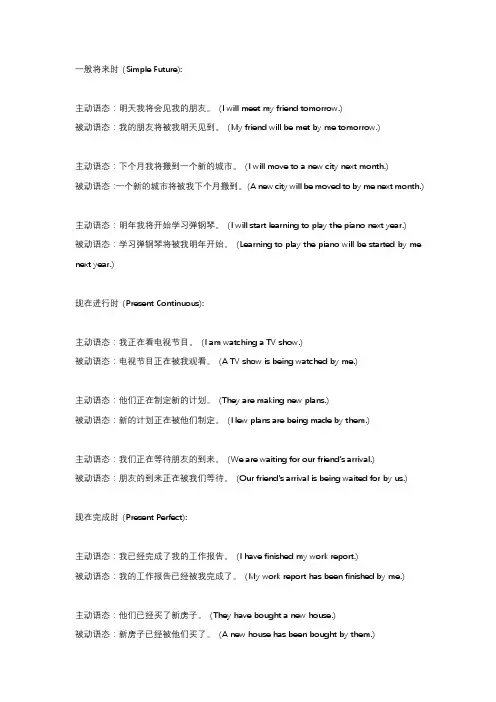
一般将来时(Simple Future):主动语态:明天我将会见我的朋友。
(I will meet my friend tomorrow.)被动语态:我的朋友将被我明天见到。
(My friend will be met by me tomorrow.)主动语态:下个月我将搬到一个新的城市。
(I will move to a new city next month.)被动语态:一个新的城市将被我下个月搬到。
(A new city will be moved to by me next month.)主动语态:明年我将开始学习弹钢琴。
(I will start learning to play the piano next year.)被动语态:学习弹钢琴将被我明年开始。
(Learning to play the piano will be started by me next year.)现在进行时(Present Continuous):主动语态:我正在看电视节目。
(I am watching a TV show.)被动语态:电视节目正在被我观看。
(A TV show is being watched by me.)主动语态:他们正在制定新的计划。
(They are making new plans.)被动语态:新的计划正在被他们制定。
(New plans are being made by them.)主动语态:我们正在等待朋友的到来。
(We are waiting for our friend's arrival.)被动语态:朋友的到来正在被我们等待。
(Our friend's arrival is being waited for by us.)现在完成时(Present Perfect):主动语态:我已经完成了我的工作报告。
(I have finished my work report.)被动语态:我的工作报告已经被我完成了。
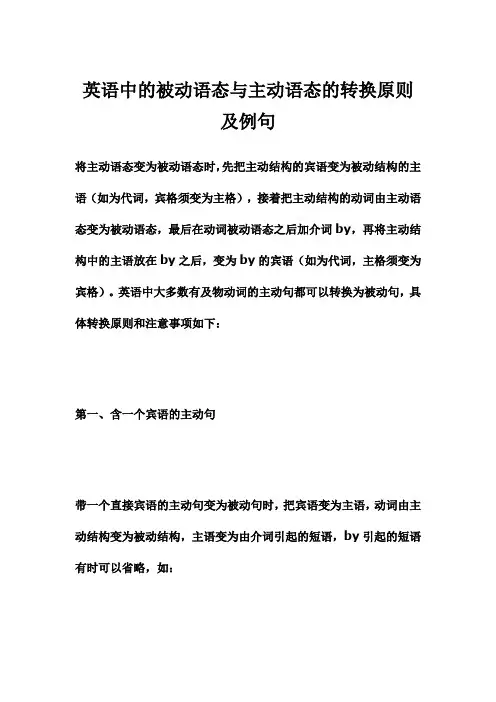
英语中的被动语态与主动语态的转换原则及例句将主动语态变为被动语态时,先把主动结构的宾语变为被动结构的主语(如为代词,宾格须变为主格),接着把主动结构的动词由主动语态变为被动语态,最后在动词被动语态之后加介词by,再将主动结构中的主语放在by之后,变为by的宾语(如为代词,主格须变为宾格)。
英语中大多数有及物动词的主动句都可以转换为被动句,具体转换原则和注意事项如下:第一、含一个宾语的主动句带一个直接宾语的主动句变为被动句时,把宾语变为主语,动词由主动结构变为被动结构,主语变为由介词引起的短语,by引起的短语有时可以省略,如:主动句:People play football all over the world.被动句:Football is played all over the world.第二、含双宾语的主动句带一个直接宾语和一个间接宾语的主动句变为被动句时,只把其中一个宾语变为主语,如:主动句:My friend lent me those books.被动句:Those books were lent (to) me by my friend.第三、含两个直接宾语的主动句带有两个直接宾语的主动句变为被动句时,通常只把表示人的宾语改为主语,表示事物的宾语一般不变,如主动句:They asked him some questions.被动句:He was asked some questions (by them).第四、含that宾语从句的主动句当含有that的宾语从句的主动句变为被动句时,通常以间接宾语作为主语,that从句不变;主动句:She told me that the teacher would come soon.被动句:I was told that the teacher would come soon.第五、含复合宾语的主动句带有宾语和宾语补足语的主动句变为被动句时,把宾语变为主语,原来的宾语补足语保留不变,但在作用上为主语补足语。
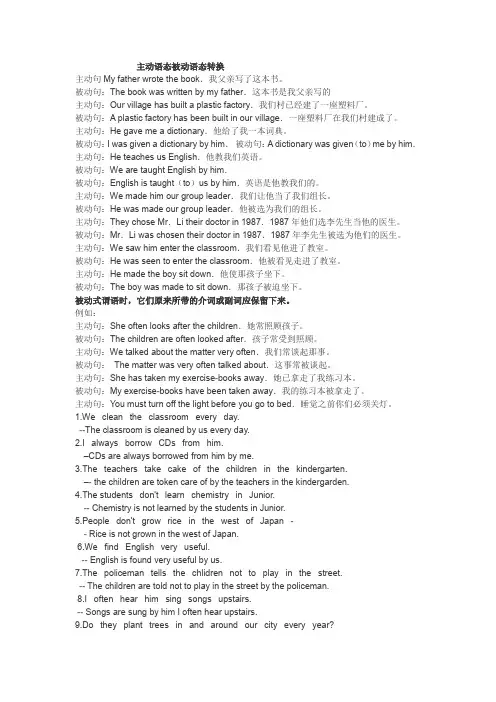
主动语态被动语态转换主动句My father wrote the book.我父亲写了这本书。
被动句:The book was written by my father.这本书是我父亲写的主动句:Our village has built a plastic factory.我们村已经建了一座塑料厂。
被动句:A plastic factory has been built in our village.一座塑料厂在我们村建成了。
主动句:He gave me a dictionary.他给了我一本词典。
被动句:I was given a dictionary by him.被动句:A dictionary was given(to)me by him.主动句:He teaches us English.他教我们英语。
被动句:We are taught English by him.被动句:English is taught(to)us by him.英语是他教我们的。
主动句:We made him our group leader.我们让他当了我们组长。
被动句:He was made our group leader.他被选为我们的组长。
主动句:They chose Mr.Li their doctor in 1987.1987年他们选李先生当他的医生。
被动句:Mr.Li was chosen their doctor in 1987.1987年李先生被选为他们的医生。
主动句:We saw him enter the classroom.我们看见他进了教室。
被动句:He was seen to enter the classroom.他被看见走进了教室。
主动句:He made the boy sit down.他使那孩子坐下。
被动句:The boy was made to sit down.那孩子被迫坐下。
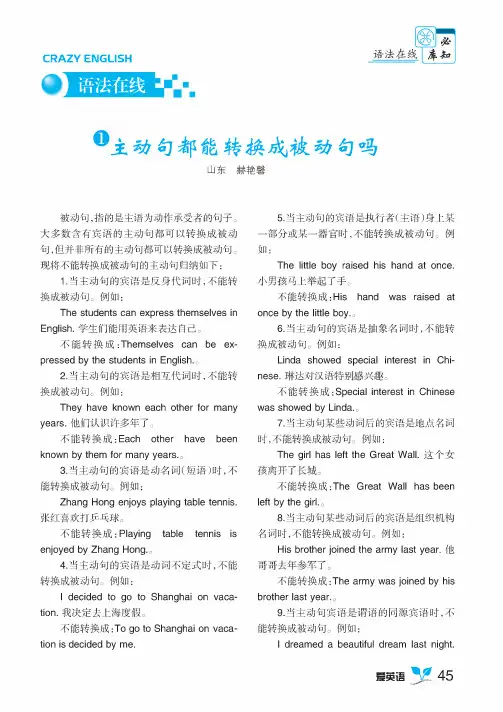
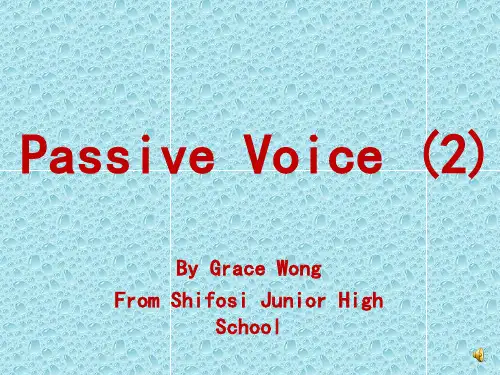
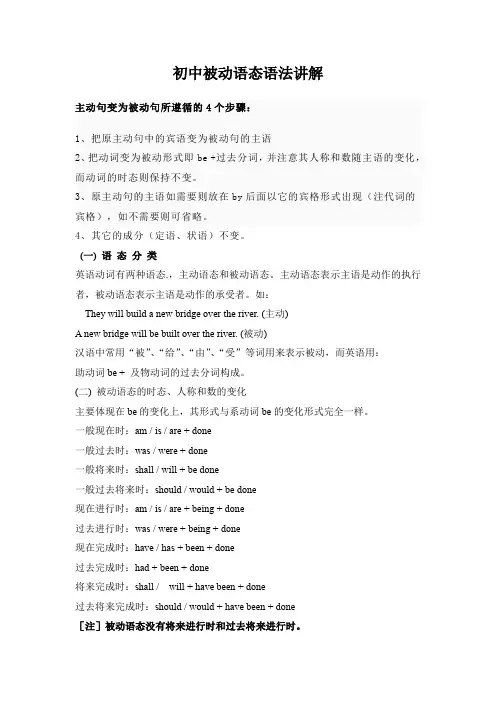
初中被动语态语法讲解主动句变为被动句所遵循的4个步骤:1、把原主动句中的宾语变为被动句的主语2、把动词变为被动形式即be +过去分词,并注意其人称和数随主语的变化,而动词的时态则保持不变。
3、原主动句的主语如需要则放在by后面以它的宾格形式出现(注代词的宾格),如不需要则可省略。
4、其它的成分(定语、状语)不变。
(一) 语态分类英语动词有两种语态.,主动语态和被动语态。
主动语态表示主语是动作的执行者,被动语态表示主语是动作的承受者。
如:They will build a new bridge over the river. (主动)A new bridge will be built over the river. (被动)汉语中常用“被”、“给”、“由”、“受”等词用来表示被动,而英语用:助动词be + 及物动词的过去分词构成。
(二) 被动语态的时态、人称和数的变化主要体现在be的变化上,其形式与系动词be的变化形式完全一样。
一般现在时:am / is / are + done一般过去时:was / were + done一般将来时:shall / will + be done一般过去将来时:should / would + be done现在进行时:am / is / are + being + done过去进行时:was / were + being + done现在完成时:have / has + been + done过去完成时:had + been + done将来完成时:shall / will + have been + done过去将来完成时:should / would + have been + done[注]被动语态没有将来进行时和过去将来进行时。
(三)常见的八种时态中的被动语态1. 一般现在时:(1)People grow rice in the south of the country.Rice is grown in the south of the country.(2)The school doesn't allow us to enter the chemistry lab without a teacher. We are not allowed to enter the chemistry lab without a teacher.2. 一般过去时:(1)They agreed on the building of a new car factory last month.The building of a new car factory was agreed on last month.(2)The students didn't forget his lessons easily.His lessons were not easily forgotten3. 一般将来时:(1)They will send cars abroad by sea.Cars will be sent abroad by sea.(2)They will give plenty of jobs to school-leavers.Plenty of jobs will be given to school-leavers.4. 过去将来时:(1)The manager said they would complete the project by the end of the year. The manager said the project would be completed by the end of the year. (2) The workers told me they would mend the car as soon as possible.The workers told me that the car would be mended as soon as possible.5. 现在进行时:(1)The radio is broadcasting English lessons.English lessons are being broadcasted on the radio.(2) We are painting the rooms.The rooms are being painted.6. 过去进行时:(1)The workers were mending the road.The road was being mended.(2)This time last year we were planting trees here.Trees were being planted here this time last year.7. 现在完成时:(1)Someone has told me the sports meeting might be put off.I have been told the sports meeting might be put off.(2)He has brought his book here.His book has been brought here.8. 过去完成时:(1)When I got to the theatre, I found they had already sold out the tickets.When I got to the theatre, I found the tickets had already been sold out.(2) The whole country was very sad at the news of his death; People had considered him to be a great leader.He had been considered to be a great leader(四)含有情态动词的被动语态:含有情态动词的被动语态是由“情态动词+ be+ 及物动词的过去分词”构成。
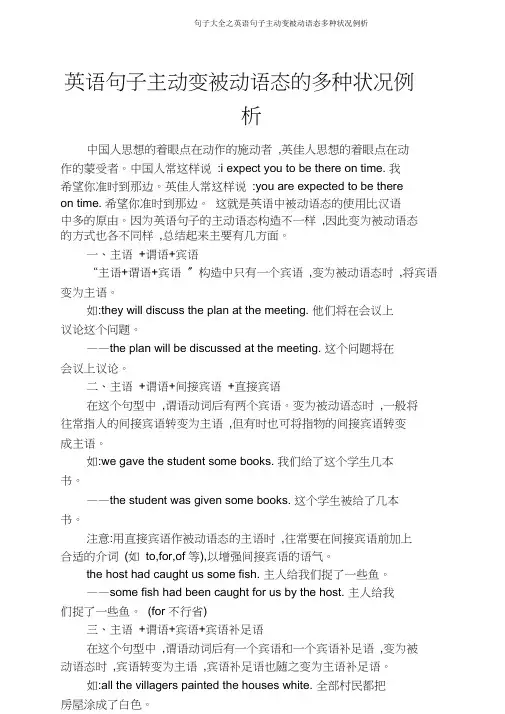
英语句子主动变被动语态的多种状况例析中国人思想的着眼点在动作的施动者,英佳人思想的着眼点在动作的蒙受者。
中国人常这样说:i expect you to be there on time. 我希望你准时到那边。
英佳人常这样说:you are expected to be thereon time. 希望你准时到那边。
这就是英语中被动语态的使用比汉语中多的原由。
因为英语句子的主动语态构造不一样,因此变为被动语态的方式也各不同样,总结起来主要有几方面。
一、主语+谓语+宾语“主语+谓语+宾语〞构造中只有一个宾语,变为被动语态时,将宾语变为主语。
如:they will discuss the plan at the meeting. 他们将在会议上议论这个问题。
——the plan will be discussed at the meeting. 这个问题将在会议上议论。
二、主语+谓语+间接宾语+直接宾语在这个句型中,谓语动词后有两个宾语。
变为被动语态时,一般将往常指人的间接宾语转变为主语,但有时也可将指物的间接宾语转变成主语。
如:we gave the student some books. 我们给了这个学生几本书。
——the student was given some books. 这个学生被给了几本书。
注意:用直接宾语作被动语态的主语时,往常要在间接宾语前加上合适的介词(如to,for,of 等),以增强间接宾语的语气。
the host had caught us some fish. 主人给我们捉了一些鱼。
——some fish had been caught for us by the host. 主人给我们捉了一些鱼。
(for 不行省)三、主语+谓语+宾语+宾语补足语在这个句型中,谓语动词后有一个宾语和一个宾语补足语,变为被动语态时,宾语转变为主语,宾语补足语也随之变为主语补足语。
如:all the villagers painted the houses white. 全部村民都把房屋涂成了白色。
五年级英语主动句转被动句单选题30题1.Mum cleans the room every day. The room ____ by Mum every day.A.is cleanedB.cleanedC.was cleanedD.cleans答案:A。
本题考查一般现在时的被动语态。
主动句的时态是一般现在时,变为被动句时要用be 动词加过去分词的形式。
选项 A 符合被动语态的结构;选项B 缺少be 动词;选项C 是一般过去时的被动语态;选项D 是主动语态的形式。
2.Dad waters the flowers in the garden. The flowers in the garden ____ by Dad.A.is wateredB.are wateredC.was wateredD.waters答案:B。
主语“the flowers”是复数,被动语态要用be 动词的复数形式are 加过去分词。
选项 A 是单数形式;选项 C 是一般过去时的被动语态;选项D 是主动语态。
3.I wash my clothes on Sundays. My clothes ____ on Sundays.A.is washedB.are washedC.was washedD.washes答案:B。
“my clothes”是复数,被动语态用are 加过去分词。
选项 A 是单数形式;选项C 是一般过去时的被动语态;选项D 是主动语态。
4.The teacher corrects our homework every day. Our homework ____ by the teacher every day.A.is correctedB.correctedC.was correctedD.corrects答案:A。
考查一般现在时的被动语态。
选项 A 符合被动语态结构;选项B 缺少be 动词;选项C 是一般过去时的被动语态;选项D 是主动语态。
被动从句知识点总结首先,被动语态的被动从句用法如下:1. 主动句变被动句。
例如:主动句:They built the house last year.被动句:The house was built last year.2. 被动从句作状语。
例如:He was told that the meeting had been cancelled.他被告知会议已经取消了。
3. 被动从句做宾语。
例如:I heard that the new library will be opened next month.我听说新图书馆下个月就要开放了。
4. 被动从句作主语。
例如:It is said that he will be promoted soon.据说他很快就要被提拔了。
其次,不定式的被动语态的被动从句用法如下:1. 不定式的被动语态的构成为“to be + 过去分词”。
例如:The book is said to be written by a famous writer.据说这本书是由一位著名作家撰写的。
2. 不定式的被动语态的被动从句可以作为句子的谓语、宾语、主语等。
例如:As you know, the project is meant to be completed by the end of the year.正如你所知,这个项目是打算在年底之前完成的。
3. 不定式的被动语态的被动从句可以辅助引导各种表语从句、宾语从句。
例如:She wants her son to be educated abroad.她希望她的儿子在国外接受教育。
总而言之,被动从句是英语语法中一个重要的知识点,掌握了被动从句的用法,能够帮助我们更好地理解和运用英语语法。
因此,我们需要通过大量的阅读和实践来不断加深对被动从句的理解和掌握,从而提高自己的英语水平。
学习好资料主动语态与被动语态相互转换,每空一词(含缩写)。
1. Wecall maths the languageof science. (改为被动句)Maths the language of science.2.Where did they plant trees?(改为被动句)Where trees ?3.You can borrow two books at a time.(改为被动句)Two booksat a time.4.The teacher made the students copy the text. 改为被动句The students copy the text.5. They producesilk in Suzhou.(改为被动句)Silk in Suzhou.6. They builta bridge between the two islands last year. (改为被动句)A bridgebetween the two islands last year.7. A birthday party will be giventomorrow. (改为主动句)We a birthday party tomorrow.8.John was seen to cross the street just now by someone. (改为主动句)Someone John the street just now.9. Can another way be thought of to keep your wine or water warm? (改为主动句)Can another way to keep your wine or waterwarm?10. Too many trees are still being cut down in the USA. (改为主动句)are still down too many trees in the USA.主动语态与被动语态相互转换,每空一词(含缩写)。
主动句改被动句英语题【主动句转被动句】主动句改被动句英语题【主动句转被动句】主动句转被动句1 his mother told him not to waste time on fishing.2 Father gave me a toy at Christmas.3 This factory produces machine tools.4 They should do it at once.5 He is likely to let you down.6 They named the child tom.答案1 He was told not to waste time on fishing (by his mother).2 I was given a toy at Christmas (by my father).3 Machine tools are produced in this factory.4 It should be done at once (by them).5 You are likely to be let down.6 The child was named tom.以上几个例子都是从语法书摘抄的。
代表了几种不同形式的被动变法。
1\2是不同的动宾短语中宾语变被动;3是一般变被动;4是情态动词变被动;5是不定式变被动;6是主—动—宾—补结构的主动句变被动。
把下列句子变成被动语态1.We found some jewels in a box.2. The teacher is keeping the pupils at school for a revision.3. James has left a parcel for you.4. You must finish the article before Friday.5. They will not paint the house again next year.6. They promised Mary a new doll for her birthday.7. I have told the children many times not to skate on the pond.8. Where did he translate the story?9. We had to repair our TV set.10. Do they take good care of the sick?11. They pany has paid the workers very handsome wages.12. They showed me the room where they lived.把下列句子变成主动语态1.Spanish is spoken in South America.2. The plans will have to be revised.3. All the words must be looked up in a dictionary.4. Has John been cured of his heart illness?5. The door should not have been left open all night.6. We are afraid that we may be attacked at night.7. We are being taught how to operate the new machine.用动词的正确时态填空Our desks and chairs ________________ (make) of wood. The paper of books and newspapers ______ also ___________ (make) from wood. Even some kinds of cloth __________________ (make) from it. Many people ____________ (burn) wood to keep themselves warm in winter. Indeed, wood _______ (be) important in our everyday life.Where ________ wood __________ (e) from? It________________ (take) from trees which _____________(grow) in the mountains. _________ you ____________ (know) how it ____________ (get) to us from the mountains?First of all, trees ___________(cut) down when they______________(grow) big enough. Then their panches_______________ (cut) off, and logs_______________(make).These heavy logs ________________(put) together in different ways and _________________ (take) down to the foot of the mountains. Some of them _________________ (float 使漂流) down the small rivers and others_________________ (carry) down on trains.Big trees ________________(cut) down in the mountains every year. Then young ones ______________________ (must, plant) so that we ______ always ________________ (can, have) enough wood. We have to take good care of mountains so that they __________ always _________________ (may, cover) with growing trees.翻译1.The shirt washes well.2. The shirt is being washed now.3. The door won’t lock.4. The shop is closed now.5. The room is filled with smoke.6. It is reported that the big fire has been put out.7. 台湾属于中国.8. 韩寒的书很畅销.9. 这录音机不转.10. 火灾是怎样发生的?11. 这个问题值得讨论.12. 这种布摸起来很柔软.选择正确答案1. When I got to his office, I __________ that he_________ out.A. told, had beenB. was told, wasC. had told, wasD. was told, had been2. The vegetables didn’t taste very good. They ______ for too long.A. cookedB. were cookedC. had cookedD. had been cooked3. The anti-Japanese war ______ in 1937 and it ______ eight years.A. was poken, lastedB. poke out, lastedC. peak out, lastedD. poke out, was lasted4. She was heard __A______ an English song.A. to singB. singC. sangD. to be sang5. These boxes are very heavy ___.A. be carriedB. carryC. carriedD. be carrying6. The police found that the house ________ and a lot of things ________.A. had been poken into, has been stolenB. has poken into, has been stolenC. had been poken into, stolenD. has poken into, has stolen7. Coal can ________ to produce electricity for agriculture and industry.A. have usedB. usedC. be usedD. use8. John has never dreamt of _________.A. taken to AthensB. taking to AthensC. be taking to AthensD. being taken to Athens9. Nobody likes __________.A. laughed atB. laughing atC. being laughed atD. being laughed10. The pidge ___________ will be pleted next year.A. builtB. being builtC. is being builtD. building11. It is said that tigers ________ in Asia year after year.A. are being disappearedB. are disappearingC. will be disappearedD. will disappear12. I’m going to Wuhan tomorrow. Do you have anything ____ to your mother?A. to takeB. takenC. to be takenD. taking13. Take it easy. There is nothing ______.A. to worry B . to be worriedC. to be worried aboutD. to worry about14. Your new puter will soon bee outdated, becausetechnology_______so fast.A. is developedB. is being developedC. has been developedD. will developed15. I won’t go to the party unless _________.A. invitedB. being invitedC. be invitedD. inviting16. The problem ________ last week is very important.A. was discussedB. discussedC. being discussedD. be discussed17. We should keep the animals from ________.A. be endangeredB. endangeringC. being endangeredD. endangered18. There are no rivers _______out of the Dead Sea.A. flowedB. flowingC. being flowedD. be flown19. This place has been destroyed. So there is no bamboo ______for pandas to feed on.A. leftB. leavingC. leaveD. be left20. All the preparations for the task ________ , and we are ready to start.A. pletedB. pleteC. had been pletedD. have been pleted高一英语被动语态基本功过关一、选择题(每小题1分共40分)1._____ a new lipary _____ in our school last year?A. Is ; builtB. Was ; builtC. Does ; build D .Did ; build2.An aident ____ on this road last week.A. has been happenedB. was happenedC. is happenedD. happened3.Cotton ____ in the southeast of China.A. is grownB. are grownC .grows D. grow4.So far, the moon ____ by man already.A. is visitedB. will be visitedC. has been visitedD. was visited5.A talk on Chinese history _____ in the school hall next week.A. is givenB. has been givenC. will be givenD. gives6.A lot of things ____ by people to save the little girl now.A. are doingB. are being doneC. has been doneD. will be done7.The doctor _____ for yet.A. isn"t sentB. hasn"t been sentC. won"t be sentD. wasn"t sent8.--When ___ this kind of puter______? --Last year.A. did; useB. was; usedC. is; usedD. are; used9.Who _____ this book _____?A. did; writtenB. was; written byC. did; written D .was; written10.Mary ____ show me her new dictionary.A. has asked toB. was asked toC. is asked D .asks to11.A story _____ by Granny yesterday.A. was told usB. was told to usC. is told us D .told us12.The monkey was seen _____ off the tree.A. jumpB. jumpsC. jumpedD. to jump13.Older people ____ well.A. looks after B .must be looked afterC. must look after D .looked after14.Our teacher ______ carefully.A. should be listened toB. should be listenC. be listenedD. is listened15. In some part of the world, tea _______ with milk and sugar.A. is servingB. is servedC. servesD. served16. It was reported that the murderer _______ arrested.A. has beenB. had beenC. hasD. had17. Do you think that the pidge ______ in a year?A. would be pletedB. will be pletedC. had been pletedD. is being pleted18. Great changes _______ in China since the People’sRepublic of China _______ in 1949.A. have taken place; was foundedB. has taken place; was foundedC. have been taken place; foundedD. took place; founded19. —Why does Ling Ling look so unhappy?—She has _______ by her classmates.A. laughedB. laughed atC. been laughedD. been laughed at20. Doctors _______ in every part of the world.A. needB. are needingC. are neededD. will need21. I promise that matter will _______.A. be taken careB. be taken care ofC. take careD. take care of22. No permission has ________ for anybody to enter thebuilding.A. been givenB. given.C. to give D. be given23. I ___ ten minutes to decide whether I should reject the offer.A. gaveB. was given。
1.His parents are sending him abroad.
2.Our teacher gave me two books.
3.They call me little Li.
4.We must take food care of the old.
5.They made him go.
6. He gave her some money.
7. He bought her a watch.
8. She made him a new coat.
9. He wrote her a letter.
10. He answered me that question.
11. He broke the cup.
12.Lily told me that she would come back soon
13.Who swept the floor today?
14. He gave the boy an apple.
15. They watched the children sing that morning.
16. We must take good care of the young trees.
17. People believe that he is ill.
18. History is made by the people.
19. They arrived at a decision.
20. He looked into the question.
答案
1、He is being sent abroad by his parents.
2、Two books are given to me by our teacher.
3、I called little Li by them.
4、The old must be taken good care of by us.
5、He was made to go by them.
6、She was given some money. / Some money was given to him.
7、A watch was bought for her. / She was bought a watch.
8、A new coat was made for him.
9、A letter was written to her.
10.I was answered that question by him.
11. The cup was broken by him.
12. I was told by Lily that she would come back soon
13. Who the floor was swept by today?
14. The boy was given an apple.
15. The children were watched to sing that morning.
16. The young trees must be taken good care of.
17. It is believed that he is ill.(或:He is believed to be ill.)
18. The people make history.
19. A decision was arrived at.
20. The question was looked into.。